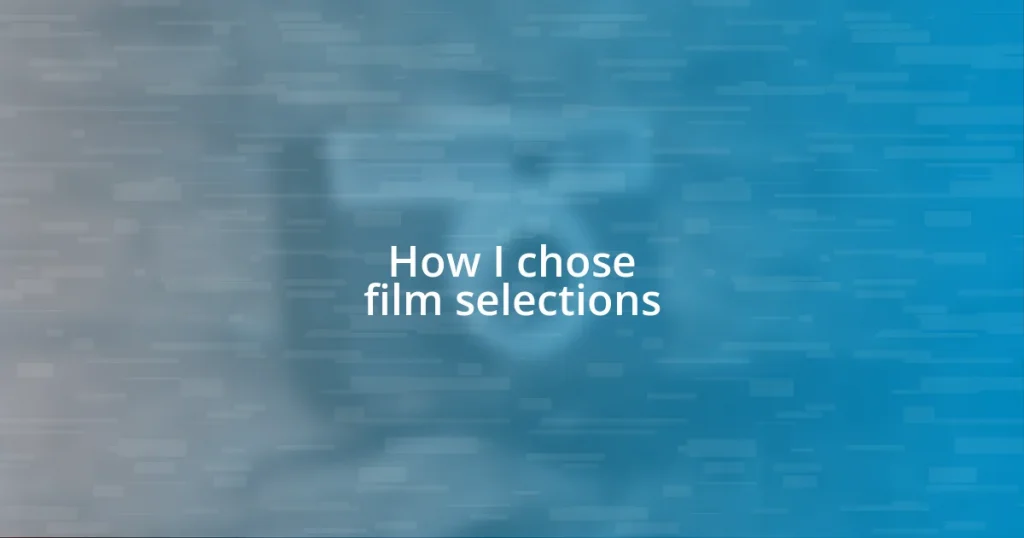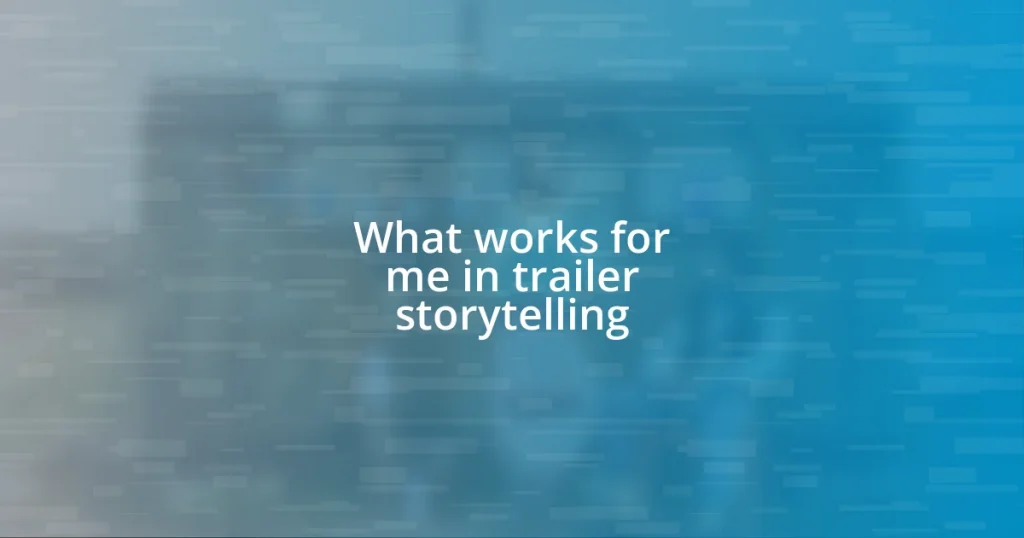Key takeaways:
- Personal film tastes are shaped by individual emotions, experiences, and life circumstances, influencing choices that provide comfort or reflection.
- Exploring different film genres reveals their cultural significance and emotional depth, enhancing the understanding of personal and societal narratives.
- Reflecting on film selection outcomes fosters self-discovery, allowing viewers to identify patterns in their preferences and how films resonate with their current life experiences.
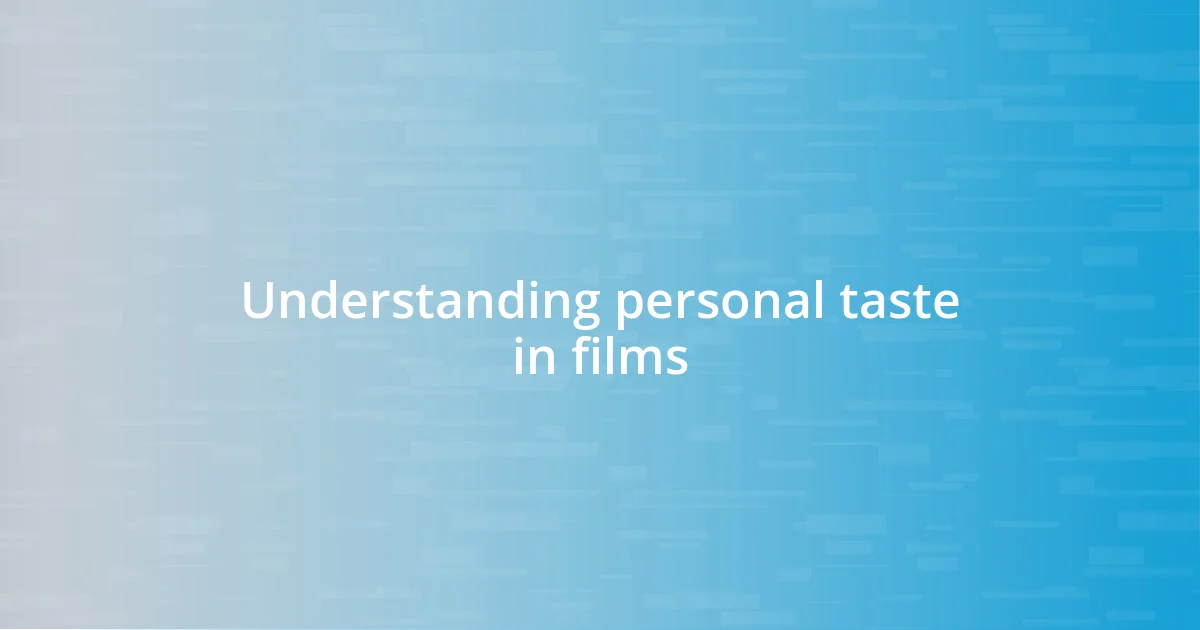
Understanding personal taste in films
Understanding personal taste in films is a deeply subjective experience influenced by individual backgrounds, emotions, and experiences. I remember the first time I watched a classic film—it was “Casablanca.” The blend of nostalgia, love, and sacrifice resonated with me, making me appreciate stories that evoke similar feelings. Have you ever felt that electric connection with a film? That’s when you realize how personal tastes begin to form.
My film choices often reflect my mood and current life circumstances. For instance, during a challenging period, I found solace in uplifting comedies, which allowed me to escape reality, even if just for a moment. It made me wonder: how many of us choose films as a form of therapy? Exploring our cinematic preferences can reveal a lot about what we seek in life, whether it’s joy, thrill, or introspection.
As I delve deeper into my film selections, I notice patterns emerge—certain genres or themes that speak to me time and again. For instance, I’ve always been drawn to stories of resilience and triumph. There’s something profoundly comforting about watching characters overcome obstacles that mirrors our own struggles in life. Isn’t it fascinating how these choices serve as both a reflection and a response to what we seek in our own journeys?
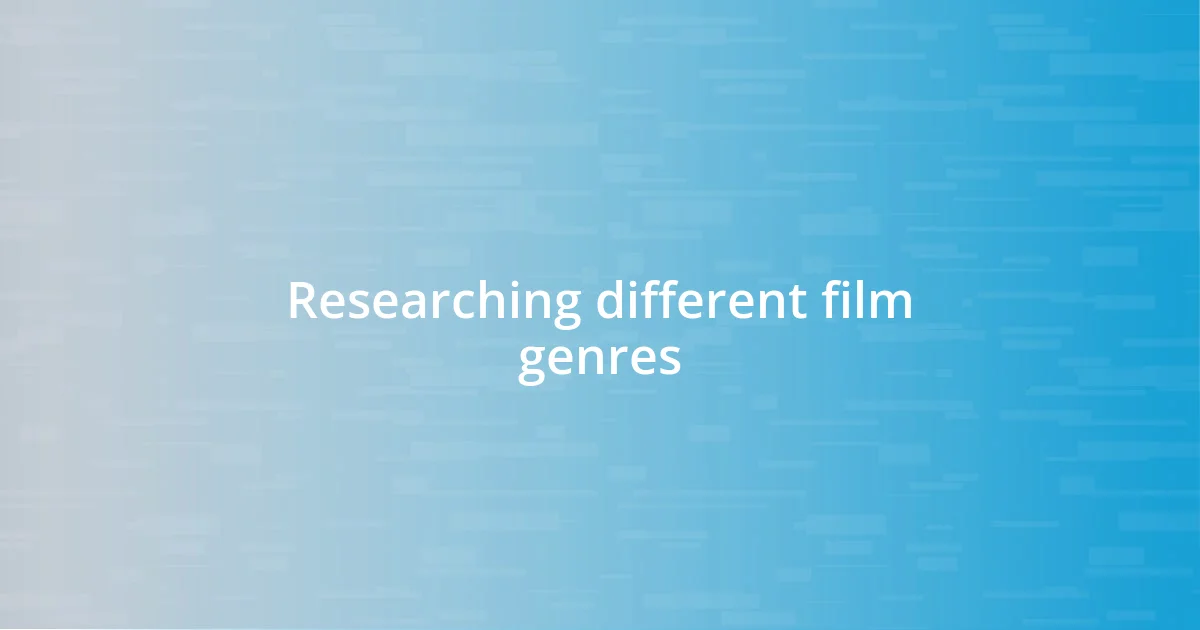
Researching different film genres
When I started researching different film genres, I quickly realized that each genre carries its own unique language and cultural significance. For instance, I was captivated by how horror films embrace fear to explore deeper psychological themes. The tension and atmosphere can be so powerful that they leave a lasting impression on how we view our own fears. It’s like peeling back layers of a complex onion; each layer reveals something new and often unsettling about our human experience.
Here are some key genres that sparked my curiosity during my research:
- Horror: Explores fear and the subconscious, often reflecting societal anxieties.
- Romantic Comedy: Highlights the ups and downs of love with humor and heart, resonating with personal experiences of romance.
- Documentary: Delivers real stories that challenge perceptions and inspire action, which can provoke strong emotional responses.
- Sci-Fi: Proposes futuristic scenarios that encourage us to question reality and our place in the universe.
- Animation: Blends art and storytelling, often conveying profound themes in a visually stunning way.
As I dived into these genres, I discovered how they not only entertain but also serve as mirrors reflecting societal values and personal truths. Each film I watched peeled back layers of understanding, helping me articulate what I appreciate most about storytelling. For instance, I found that animated films often tug at my heartstrings in ways I wouldn’t have expected, reminding me of the simplicity and complexity of human emotions. They can hold powerful messages in whimsical packages that resonate profoundly.
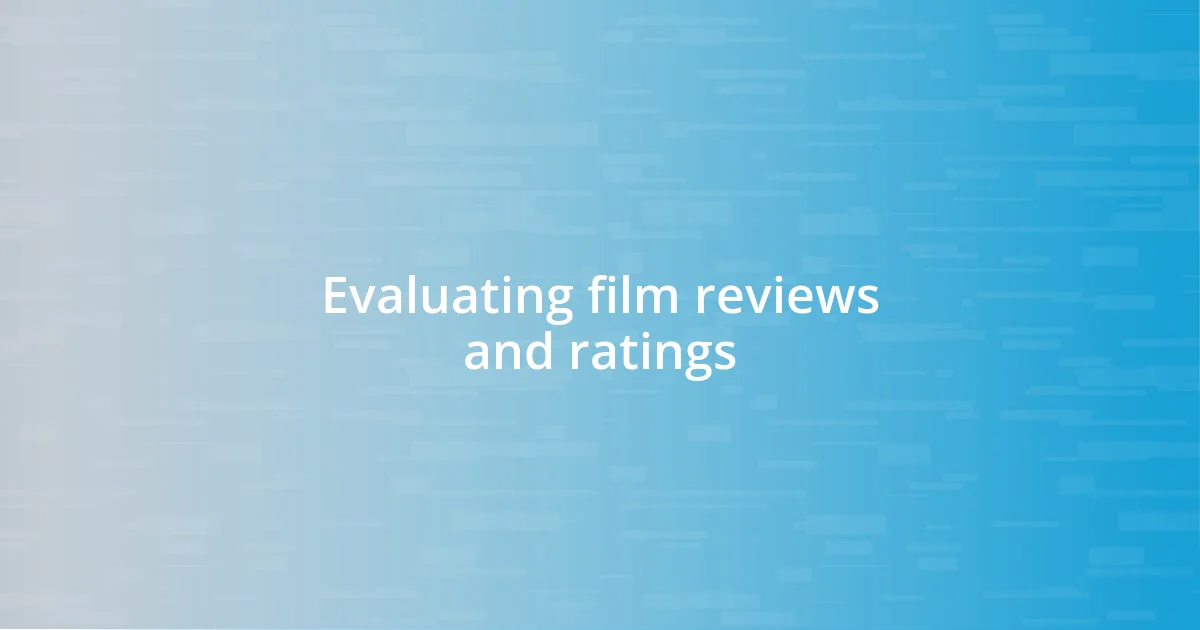
Evaluating film reviews and ratings
Evaluating film reviews and ratings is a crucial step in my film selection process. I often find myself sifting through different platforms like Rotten Tomatoes and IMDb, looking beyond mere star ratings. For me, it’s not just about how many stars a film receives but also understanding the reviews behind that score. It’s fascinating how a single review can resonate with my personal experiences and influence my perception of a film.
I recall stumbling upon a scathing review of a film I had been excited to watch. The reviewer’s passionate critique of its lack of character development struck a chord with me. It made me reflect on my own preferences; I realized that well-crafted characters are a must for me, as they allow deeper emotional connections. This experience reinforced how personal interpretations can differ wildly from mainstream opinions, showcasing the subjective nature of film appreciation.
When assessing ratings, it’s helpful to compare different sources and identify patterns. Here’s a quick comparison to illustrate this:
| Source | Rating System |
|---|---|
| Rotten Tomatoes | Percentage (Fresh/Rotten) |
| IMDb | 1-10 scale |
| Metacritic | Weighted Average Score (0-100) |
| User Reviews | Freeform Review & Rating |
By assessing the nuances between these ratings, I’ve learned to trust my instincts while incorporating valuable insights from others. It’s like piecing together a puzzle—each review adds depth to my understanding, ultimately leading me to films that align with my tastes and emotional needs.

Analyzing directors and actors
When I analyze directors and actors, I feel a profound connection to their craft. Take Martin Scorsese, for instance; his storytelling often delves into the complexities of morality and human nature. I can’t help but admire how his ability to merge character depth with narratives makes me think about my own choices in life. Isn’t it compelling when a film prompts you to reflect on your personal ethics?
On the other hand, actors can transform a script into something extraordinary. I remember watching a performance by Viola Davis in “Fences,” where her portrayal of vulnerability struck a deep chord with me. It’s as if she unlocked emotions within myself that I didn’t know existed. Isn’t it remarkable how an actor can encapsulate raw human experience with just a glance or a pause?
Ultimately, examining the synergy between directors and actors is crucial. Their collaborative energy can elevate a film to monumental heights. I often ask myself how certain creative partnerships lead to cinematic magic, and then I realize that it’s the unique blend of vision and talent that makes all the difference. What are some of your favorite director-actor pairings that have left a lasting impression?
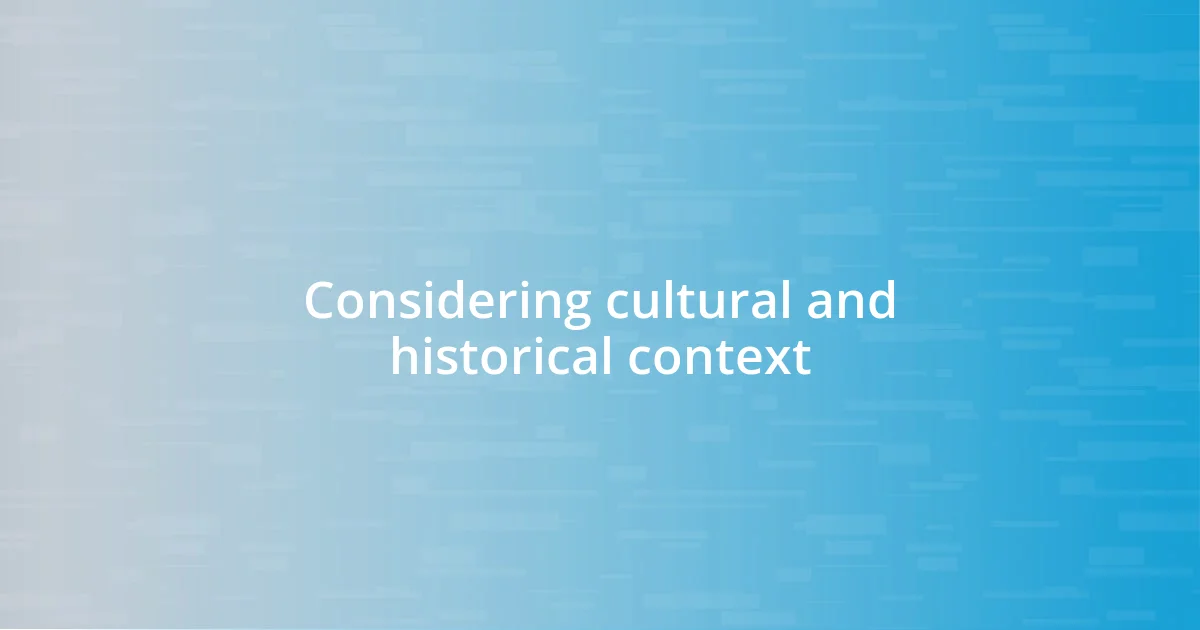
Considering cultural and historical context
Considering the cultural and historical context can truly enrich the experience of watching a film. I remember watching “12 Years a Slave” and feeling the weight of its historical accuracy. This film wasn’t just a story; it was a visceral reminder of the painful chapter in American history, and understanding this context made the journey through its narrative profoundly impactful for me. I felt compelled to reflect on how the past shapes our present, prompting an emotional reckoning that’s often missing when films brush over their historical backgrounds.
Moreover, I find that cultural context can impart layers of meaning that resonate differently depending on the viewer’s own experiences. For example, when I watched “Parasite,” I wasn’t just intrigued by its thrilling plot—I was struck by the stark economic disparity it illustrated. Having lived in communities with various socio-economic backgrounds, the dynamics depicted in the film felt eerily familiar. It got me wondering: how often do we overlook these cultural nuances that make a film relevant to today’s society?
Ultimately, recognizing these contexts can lead to a deeper appreciation of the film’s artistry. I think of documentaries like “Won’t You Be My Neighbor?” which explore the life and philosophy of Fred Rogers. The historical lens through which Neighbors is told enhances its message about kindness and community. It makes me ask, how does the cultural foundation of a film influence the legacy it leaves behind? Such reflection invariably enriches the viewing experience, making it more than just entertainment; it becomes a profound exploration of the human experience.
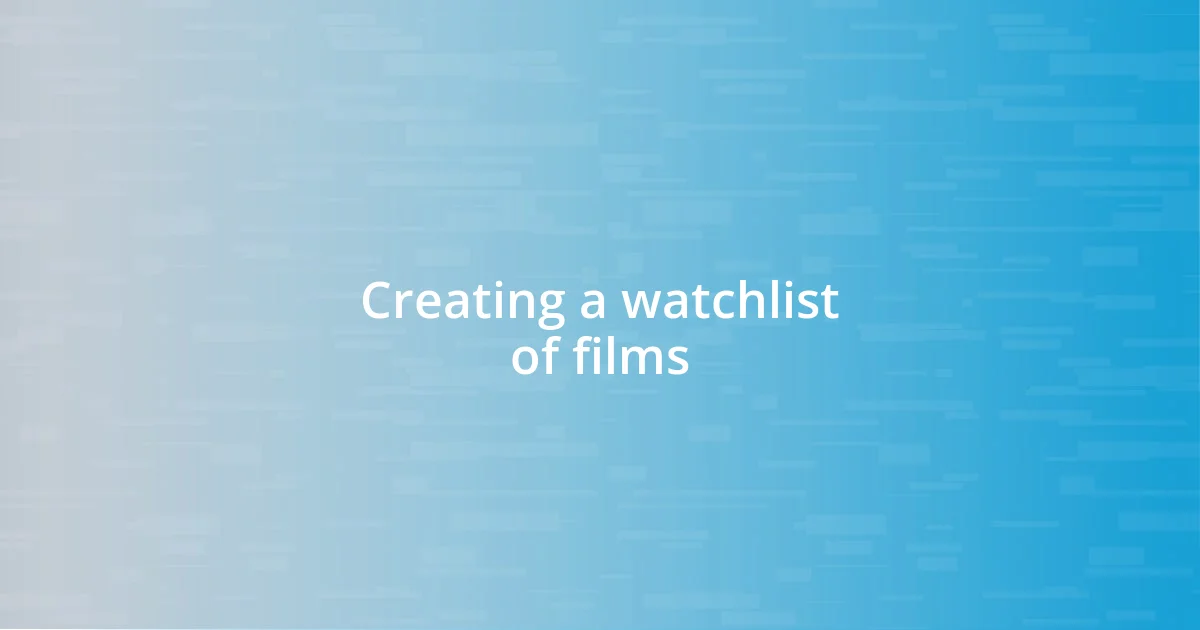
Creating a watchlist of films
Creating a watchlist of films is something I genuinely enjoy, as it reflects my taste and curiosity. Oftentimes, I collect titles from various sources—friends’ recommendations, film festivals, and reviews. Recently, I came across “The Farewell” through a friend’s excited text message. That kind of shared enthusiasm often sparks my interest and adds a personal touch to my list-making process.
While compiling my watchlist, I focus on diverse genres and styles to keep things fresh and engaging. I once watched a whimsical animated film back-to-back with a hard-hitting documentary. That contrast not only broadened my cinematic horizons but also highlighted the range of storytelling. I can’t help but wonder—how does mixing different genres affect our perception of films? For me, it adds a layer of excitement and anticipation for what’s next.
Over time, I’ve learned to trust my instincts while curating my selections. When I revisit my list, I sometimes find films that resonate deeply due to my evolving interests or life circumstances. For instance, a year ago, I couldn’t appreciate a slow-burning drama like “Paterson,” but now it speaks to me in a profound way. Isn’t it fascinating how our experiences shape our choices? I find that curating my watchlist is not just about the films themselves but also about understanding the moments in my life that draw me to them.
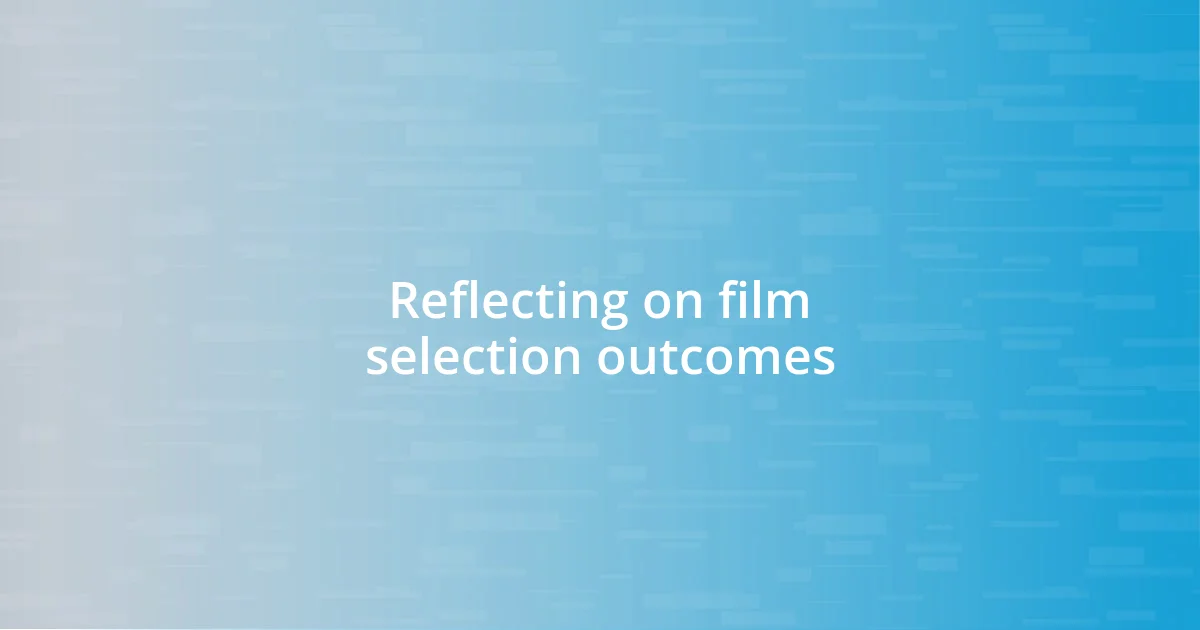
Reflecting on film selection outcomes
Reflecting on film selection outcomes can reveal surprising insights about our preferences and emotional responses. For instance, I remember choosing “Eternal Sunshine of the Spotless Mind” based on its intriguing premise alone. It wasn’t until after watching that I realized how the film’s exploration of memory and love resonated with my own experiences of heartbreak and desire for closure. I often ask myself, how do the films I choose reflect my current state of mind?
Sometimes, the outcome of a film selection can lead me to rethink my criteria. After watching “Birdman,” I found myself captivated not just by its narrative pacing but also by its commentary on identity and relevance in artistic endeavors. The film encouraged me to ask profound questions about my own aspirations: what does it mean to be significant in a world full of distractions? This introspection often shapes my future selections, as I gravitate toward films that challenge my perceptions and invite deeper reflection.
Moreover, analyzing the outcomes of my selections can sometimes highlight unexpected preferences. I was taken aback by how much I connected with “Nomadland,” a film I initially chose out of curiosity. Its themes of resilience and the search for belonging struck a chord with me, awakening feelings I hadn’t fully acknowledged. I’m left wondering—what patterns emerge in the films I choose, and how do they mirror my personal journey? Reflecting on these outcomes deepens my understanding of myself, making me more discerning in my future choices.











